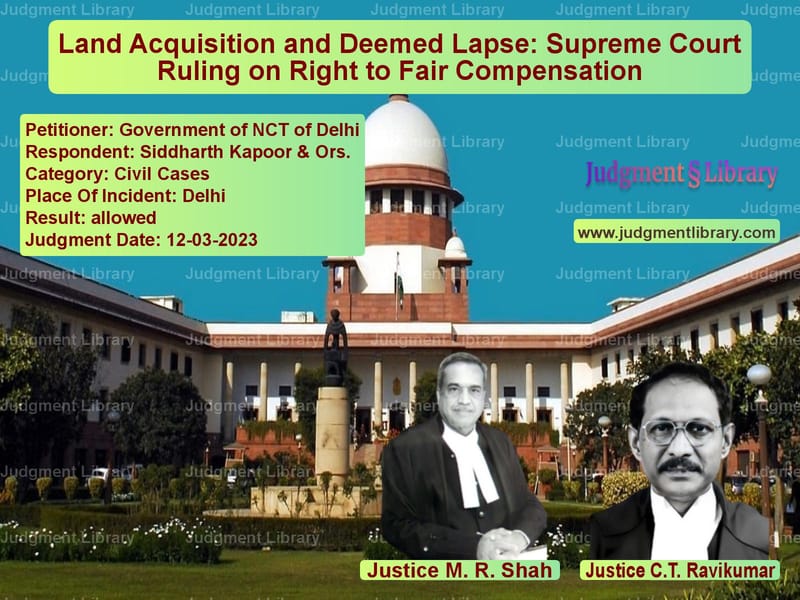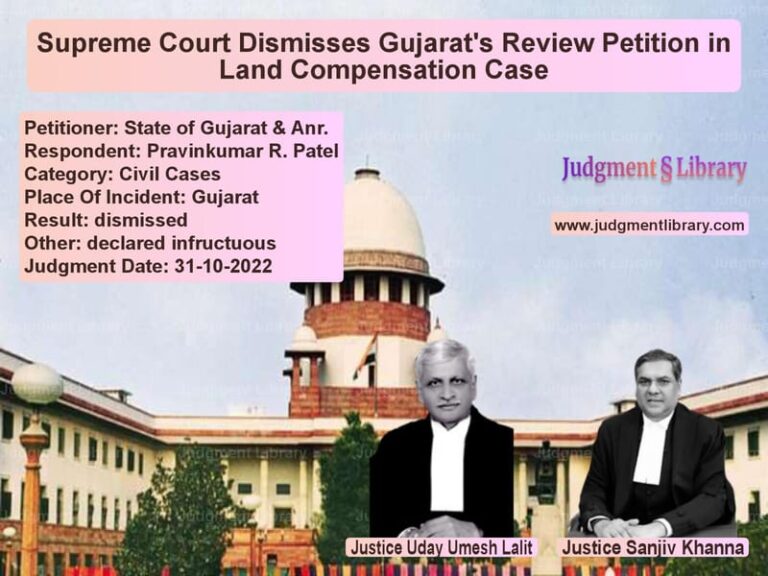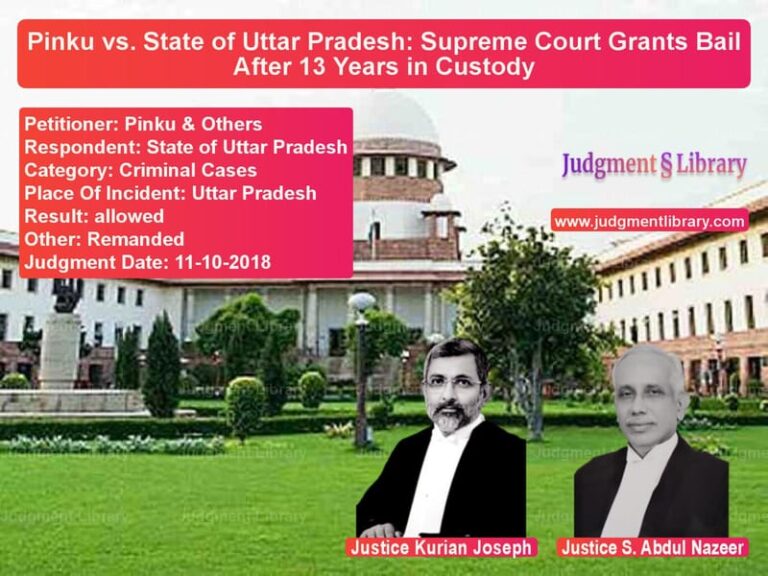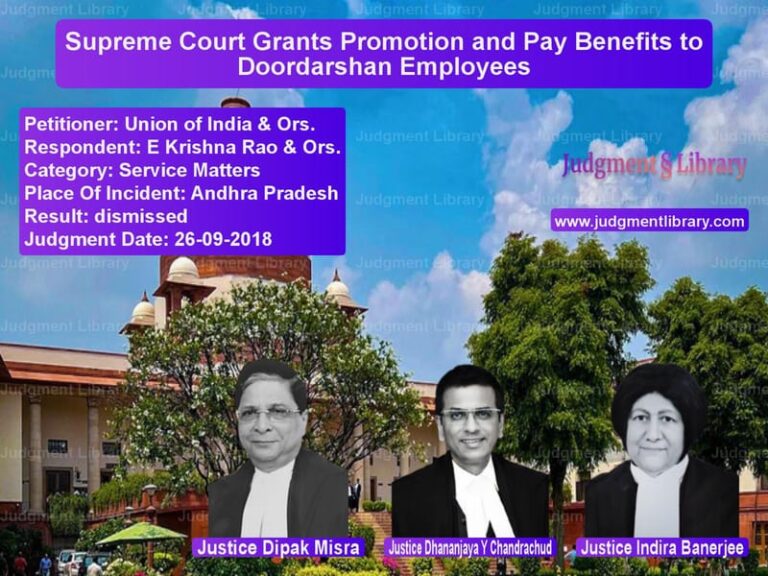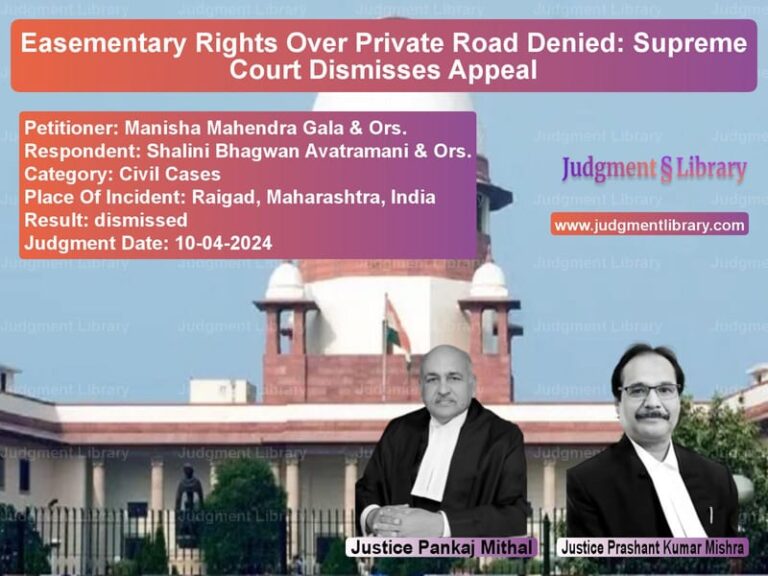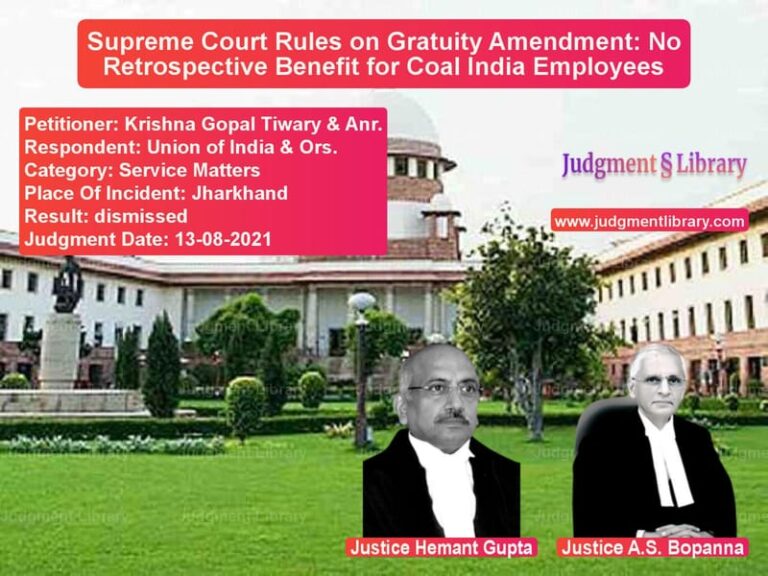Land Acquisition and Deemed Lapse: Supreme Court Ruling on Right to Fair Compensation
The Supreme Court of India has provided significant clarity on the application of Section 24(2) of the Right to Fair Compensation and Transparency in Land Acquisition, Rehabilitation and Resettlement Act, 2013 (hereinafter referred to as the 2013 Act). The judgment in Government of NCT of Delhi v. Siddharth Kapoor & Ors. deals with the issue of whether a land acquisition process initiated under the Land Acquisition Act, 1894 (hereinafter referred to as the 1894 Act) is deemed to have lapsed if possession was taken but compensation was not deposited in court.
In this case, the Supreme Court had to determine the validity of the High Court’s decision, which relied on the earlier judgment in Pune Municipal Corporation v. Harakchand Misirimal Solanki (2014). The Court’s ruling is crucial in understanding the principles governing land acquisition, the rights of landowners, and the obligations of the government.
Background of the Case
The appeal arose from a High Court decision that declared the land acquisition for the disputed property as deemed lapsed under Section 24(2) of the 2013 Act. The Government of NCT of Delhi contended that possession of the land had been taken on 31.08.2005, though compensation was not deposited in court. The High Court ruled in favor of the landowners, citing the Supreme Court’s previous ruling in Pune Municipal Corporation.
However, the Constitution Bench of the Supreme Court, in Indore Development Authority v. Manoharlal (2020), overruled the judgment in Pune Municipal Corporation and laid down fresh principles governing land acquisition. This case is significant as it revisits those principles and applies them to the facts of the present matter.
Arguments of the Parties
Petitioner’s Arguments (Government of NCT of Delhi)
- The acquisition process was initiated under the 1894 Act, and the award was made on 12.07.2005.
- The government had taken possession of the land on 31.08.2005, which means the acquisition process was completed.
- Under the ruling in Indore Development Authority, the mere non-deposit of compensation in court does not lead to a lapse of acquisition.
- The High Court wrongly relied on Pune Municipal Corporation, which has since been overruled.
Respondent’s Arguments (Siddharth Kapoor & Ors.)
- Since compensation was not deposited in court, the landowners were deprived of their rightful dues.
- The acquisition should be deemed lapsed as per the 2013 Act, which ensures fair compensation.
- The right to claim compensation is a fundamental aspect of land acquisition, and failure to pay violates legal principles.
Key Observations of the Supreme Court
The Supreme Court analyzed the provisions of Section 24(2) of the 2013 Act and reiterated the findings in Indore Development Authority. The key observations include:
- The ruling in Pune Municipal Corporation, which held that compensation must be deposited in court, has been expressly overruled.
- For a land acquisition process to be deemed lapsed under Section 24(2), two conditions must be met:
- Possession was not taken and
- Compensation was not paid.
- If possession has been taken, non-payment of compensation does not lead to lapse of acquisition.
- The phrase “paid” in Section 24(2) does not necessarily mean deposit in court; it includes tendering compensation to landowners.
- If landowners refuse to accept compensation, the government is not at fault, and the acquisition remains valid.
Final Ruling
The Supreme Court set aside the High Court’s judgment and ruled in favor of the Government of NCT of Delhi. The Court held:
- The land acquisition process does not lapse merely because compensation was not deposited in court.
- Since possession was taken in 2005, the acquisition remains valid under the 2013 Act.
- The ruling in Indore Development Authority must be followed, and previous conflicting judgments are no longer applicable.
Implications of the Judgment
This ruling clarifies several key aspects of land acquisition:
- Clarity on Lapse of Acquisition: The judgment ensures that acquisitions do not lapse due to technicalities, providing certainty for the government and landowners.
- Fair Compensation Ensured: The ruling reinforces the right of landowners to receive compensation, but it must be claimed lawfully.
- Precedent for Future Cases: The judgment sets a binding precedent that courts must follow Indore Development Authority when interpreting Section 24(2).
Conclusion
The Supreme Court’s decision in Government of NCT of Delhi v. Siddharth Kapoor & Ors. is a landmark ruling that resolves ambiguities in land acquisition laws. By reaffirming the principle that mere non-deposit of compensation in court does not lead to lapse, the Court has provided much-needed clarity and stability in this area of law. This judgment ensures that landowners receive fair compensation while also protecting the interests of the government in executing developmental projects.
Petitioner Name: Government of NCT of Delhi.Respondent Name: Siddharth Kapoor & Ors..Judgment By: Justice M. R. Shah, Justice C.T. Ravikumar.Place Of Incident: Delhi.Judgment Date: 12-03-2023.
Don’t miss out on the full details! Download the complete judgment in PDF format below and gain valuable insights instantly!
Download Judgment: government-of-nct-of-vs-siddharth-kapoor-&-o-supreme-court-of-india-judgment-dated-12-03-2023.pdf
Directly Download Judgment: Directly download this Judgment
See all petitions in Property Disputes
See all petitions in Landlord-Tenant Disputes
See all petitions in Specific Performance
See all petitions in Damages and Compensation
See all petitions in Judgment by Mukeshkumar Rasikbhai Shah
See all petitions in Judgment by C.T. Ravikumar
See all petitions in allowed
See all petitions in supreme court of India judgments March 2023
See all petitions in 2023 judgments
See all posts in Civil Cases Category
See all allowed petitions in Civil Cases Category
See all Dismissed petitions in Civil Cases Category
See all partially allowed petitions in Civil Cases Category

